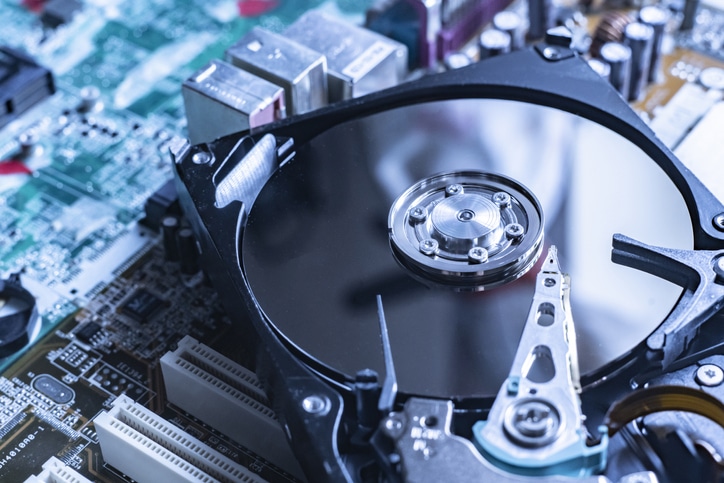
SSD or HDD Drives? Which is Better for Business?
SSD or HDD? Which is Better for Business?
A host of hardware and software is available to store system data, but the two most basic storage options remain the solid-state drive (SSD) and the hard disk drive (HDD). While solid-state drives and hard disk drives are similar in their physical specifications, they store data very differently.
There are benefits and disadvantages to each type of drive, and deciding on which type is right for your business isn’t just about comparing cost – you also need to consider performance, power usage, speed, and reliability. Here’s a quick guide on how each type of storage drive works, how they compare, and which one is the best choice for your business.
What is an HDD?
A hard disk drive is the traditional storage solution and uses the same style of electromagnetic tech that makes floppy disks and credit card strips work. The HDD uses small moving parts to seek out data on a spinning platter mechanically. HDDs work by encoding data using multiple spinning platters and a read/write head that is suspended above the rotating disk. There is also an I/O controller and firmware that tells the hardware what to do and communicate with the rest of the system. When writing or reading data on a hard drive, a physical sensor needs to move to the correct place on the disc.
HDDs are formed by dividing the platter into concentric circles called tracks, which are further divided into logical units known as sectors. The tracks and sectors produce a unique address for the storage information process. An algorithm in the system checks for errors in the given data, and only after that, is the information stored.
What’s an SSD?
SSDs are newer and faster data storage devices and are a massive improvement over HDDs. Typically, SSDs use non-volatile flash memory, meaning that the device will retain data even if you turn off your computer, but others will have volatile memory similar to RAM and use batteries to maintain power and retain their data. NOR and NAND are the two most popular flash types, but most SSDs use NAND flash memory because they are faster for writes and smaller than NOR.
Flash memory has no moving parts and near-instant access times, which speeds up the data transfer process. While HDDs have a mechanical arm to read and write data, an SSD uses a processor (controller) to read and write data, as well as storing, restoring, caching, and cleaning up data. The SSD speed of reading and writing data, and its overall performance, are determined by its controller. Without moving parts, SSDs are more durable, run cooler, and use less energy.
Difference Between SSD and HDD
- Price: One of the biggest differences between the two is the price. SSD is comparatively much more expensive than HDD – the cost of each gigabyte is placed at approximately $0.20 in SSD, while the gigabytes in HDD are placed at approximately $0.03 per gigabyte.
- Speed: This is the most significant benefit of an SSD over an HDD. Because it doesn’t have moving parts, an SSD can write 20 times faster and read data 10 times faster than an HDD. Moreover, the HDD’s copying process ranges between 30 MB/s and 150 MB/s, while a standard SSD takes 500 MB/s. That’s why SSDs deliver faster boot times, load times for applications and files, and data transfer. Also, SSDs won’t slow down over time due to use in the way that HDDs will, even if the drive is mostly full.
- Reliability and durability: With regular usage, solid-state drives usually last about ten years, a lifespan that rivals your typical hard disk drive. While it is true that SSDs wear out over time (each cell in a flash-memory bank can be written to and erased a limited number of times, measured by SSD makers as a “terabytes written” or TBW rating), you’re more likely to discard the system due to obsolescence before you start running into read/write errors with an SSD. On the other hand, HDDs will wear out much faster because of all the mechanical moving parts. Essentially, an SSD is far more durable, resistant, and travel-friendly, which is perfect for mobile workers. SSDs are also more heat-resistant, whereas HDDs tend to overheat, compromising the system’s overall performance.
- Noise and power: Even the quietest hard drive will emit a bit of noise when in use because the drive platters spin and the read arm ticks back and forth. SSDs make no noise at all since they’re non-mechanical. What’s more, an SSD doesn’t have to expend electricity spinning up a platter, and therefore none of the energy consumed by the SSD is wasted, rendering it more efficient. On a desktop or on a server, this will result in a lower energy bill, and on a tablet or laptop, you’ll be able to get more out of battery life.
- Capacity: HDD has greater storage capacity. For example, commercial HDD capacities range from 40GB up to 12TB. Although SSD capacity has increased over the past few years, it can be harder to find large-capacity solid-state drives. You can get an SSD with up to 4TB storage capacity.
- SSDs and servers: SSDs can also be a powerful addition to a server. Too many employees simultaneously trying to access data from a server can stretch the hard drive to its limits. Servers that use an SSD have easier access to information, thereby increasing office-wide productivity and reducing pressure on your server.
So, Which One is Better? SSD or HDD?
SSD is an excellent choice for businesses that manage and store heaps of data, thanks to its high speeds, high performance, and reliability in filing transfer and access times. However, a hybrid storage system composed of both SSDs and HDDs can be an ideal solution. It’s easier and more cost-effective to pair a high-cost, high-performance, high-durability SSD with a low-cost, high-capacity, bulk storage HDD that’s less write-intensive. Businesses that deal with heavy-duty server activity or hefty read/write workloads should look into enterprise SSDs. These are more expensive SSDs that are built to withstand power loss and experience lower fail rates.
Bottom Line
Understanding the differences between SSD and HDD regarding performance, endurance, and reliability can be an effective tool in managing and minimizing the risk of disruptive downtime in the demanding and often mission-critical enterprise environment.
Atlantic-IT can help you choose the right storage solution for your business. We also provide robust IT services ranging from Microsoft solutions, cybersecurity, 24/7 network monitoring, network installations, managed and co-managed IT services to cloud computing and IT consulting services. For more information about our IT services, contact us today for a no-obligation initial consultation.





